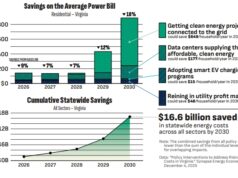by Ivy Main, cross-posted from Power for the People VA
If you need evidence that Virginia legislators finally recognize global warming as a crisis, you could simply look at this year’s plethora of bills addressing coastal flooding and resilience. We’ve barely begun to address the greenhouse gas pollution that drives climate change and sea level rise, but already Virginia has entered the age of adaptation.
Meanwhile, however, the need for mitigation measures is more pressing than ever. The new Democratic majority has responded with a long list of bills that address the problem in various ways: by joining the Regional Greenhouse Gas Initiative (RGGI), requiring energy efficiency and renewable energy investments, offering incentives for private investments, lowering barriers to investments, or all of the above.
In an earlier post I described two omnibus energy transition bills, the Clean Economy Act, HB1526 (Sullivan) and SB851 (McClellan), and the Green New Deal Act, HB77 (Rasoul). A second post brought together all the renewable energy bills.
Now I’m moving on to the rest of the climate policy bills, as well as other utility regulation.
Climate and energy policy
SB94 (Favola) rewrites the Commonwealth Energy Policy to bring it in line with Virginia’s commitment to dealing with climate change. The latest draft of the bill, as it passed out of subcommittee, sets a target for net-zero greenhouse gas emissions economy-wide by 2045, and in the electric sector by 2040. This section of the Code is for the most part merely advisory; nonetheless, it is interesting that Dominion Energy Virginia supported the bill in subcommittee.
Delegate Reid’s HB714 is similar to SB94 but contains added details, some of which have now been incorporated into SB94.
HB672 (Willett) establishes a policy “to prevent and minimize actions that contribute to the detrimental effects of anthropogenic climate change in the Commonwealth.” State agencies are directed to consider climate change in any actions involving state regulation or spending. Local and regional planning commissions are required to consider impacts from and causes of climate change in adapting comprehensive plans.
HB525 (Subramanyam and Reid) require a statewide greenhouse gas inventory covering all sectors of the economy.
HB547 (Delaney) establishes the Virginia Energy and Economy Transition Council to develop plans to assist the Commonwealth in transitioning from the use of fossil fuel energy to renewable energy by 2050. The Council is to include members from labor and environmental groups.
Meanwhile, efforts are already underway to undercut the effectiveness of all this great policy work. Witness the latest strategy from Dominion, involving a pair of bills put forward by Senator Lewis. SB828 and SB817 declare that any time the Code or the Energy Policy refers to “clean” or “carbon-free” energy, it must be read to include nuclear energy. In subcommittee, Senator Lewis suddenly announced he was amending the bill to add “sustainable biomass” as well, turning the bill into a mockery of science and the English language, not to mention terrible policy.
Biomass—that is, burning wood—causes more pollution than coal, it emits more carbon than coal, and it isn’t carbon neutral in the timeframe that matters to climate. Oh, and it’s very expensive energy. Insisting that the words “clean” and “carbon-free” include biomass is like saying the color blue includes the color yellow. It just doesn’t.
No matter. Lobbyist Katharine Bond stood up to support the bill on behalf of Dominion, as did several forestry and agriculture officials. But the sneak attack caught the environmental community off guard, and biomass experts were not in the room to cry foul. The bills were approved by the subcommittee and will now go to the full Commerce and Labor Committee.
I’m generally in awe of the creativity of the evil geniuses who must sit all day in a windowless conference room at Dominion headquarters brainstorming new ways to rip off customers and undermine efforts to address climate change. So if I say this particular effort feels a bit ham-handed, I mean no disrespect. It’s early in the session; I’m sure there are more creative ploys to come.
RGGI bills (good and bad)
The Democratic takeover of the General Assembly means Virginia will finally join the Regional Greenhouse Gas Initiative (RGGI), either according to the regulations written by DEQ or with a system in place that raises money from auctioning carbon allowances.
HB981 (Herring) is called the Clean Energy and Community Flood Preparedness Act. It implements the DEQ carbon regulations and directs DEQ to enter the RGGI auction market. Auction allowances are directed to funds for flood preparedness, energy efficiency and climate change planning and mitigation. We are told this is the Administration’s bill. A similar bill, HB20 (Lindsey), is not expected to move forward.
HB110 (Ware) says that if Virginia joins RGGI, DEQ must give free carbon allowances to any facility with a long-term contract predating May 17, 2017 that doesn’t allow recovery of compliance costs. Rumor has it the bill was written to benefit one particular company.
SB992 (Spruill) requires the Air Board to give free allowances for three years to any new power plant that was permitted before June 26, 2019, the effective date of the carbon trading regulations. It’s not clear why new facilities should get special treatment; it was not exactly a secret that these regulations were in the works. And the result of this law would be to encourage companies to go ahead and build anything that has a permit, which just can’t be a good result.
HB1628 (Poindexter) prohibits the state from joining RGGI or adopting any carbon dioxide cap-and-trade program without approval from the General Assembly.
Other utility regulation
“Other” makes this section sound like an afterthought, but in fact several of the most impactful bills of the session appear here.
HB1677 (Keam) replaces Virginia’s current vertically-integrated monopoly structure with one based on competition and consumer choice. Existing monopoly utilities would be required to choose between becoming sellers of energy in competition with other retail sellers, or divesting themselves of their generation portfolios and retaining ownership and operation of just the distribution system. Other features: a nonprofit independent entity to coordinate operation of the distribution system; performance-based regulation to reward distribution companies for reliable service; consumer choices of suppliers, including renewable energy suppliers; an energy efficiency standard; a low-income bill assistance program; and consumer protections and education on energy choices.
HB206 (Ware) is, I’m told, the beta version of Delegate Keam’s bill and will be pulled, and that Delegate Ware is on board with HB1677.
SB842 (Petersen) seeks to achieve the same end as the House bills, but it puts the SCC in charge of writing the plan. The bill provides for all retail customers of electricity to be able to choose their supplier, and instructs the SCC to promulgate regulations for a transition to a competitive market for electricity. Existing utilities will continue to provide the distribution service. The bill also requires suppliers of electricity to obtain at least 25% of sales from renewable energy by 2025, 50% by 2030, and 100% by 2050. Renewable energy is defined to include “sustainable biomass” but not waste incineration or landfill gas.
Not ready to bust up the monopolies yet? How about at least putting the SCC back in control? The last few years have seen a steady chipping away of the SCC’s authority to regulate utility rates. HB1132 (Jones, Ware) seeks to reverse this trend and possibly get some rate relief for consumers.
SB731 (McClellan) also affects rates, in this case by addressing a utility’s rate of return. The SCC determines this rate by looking first at the average returns of peer group utilities, and then often going higher. The bill lowers the maximum level that the SCC can set above the peer group average.
And finally (but by no means least), HB167 (Ware) requires an electric utility that wants to charge customers for the cost of using a new gas pipeline to prove it can’t meet its needs otherwise, and that the new pipeline provides the lowest-cost option available to it. (Note that this cost recovery review typically happens after the fact, i.e., once a pipeline has been built and placed into service.) Last year Ware carried a similar bill that passed the House in the face of frantic opposition from Dominion Energy, before being killed in Senate Commerce and Labor.















